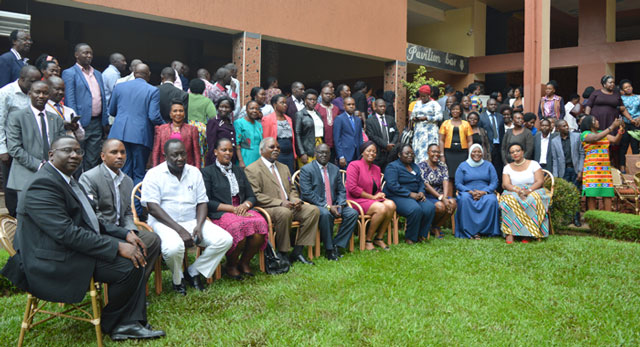
Leveraging information technologies is crucial in mitigating challenges posed by new normal of COVID-19
COMMENT | PHOEBE ATUKUNDA | The Government of Uganda decentralised human resources management and development to Local Governments (LGs) under Section 126 of the Local Governments Act Cap 243. This legislation gives LGs powers to determine their human resource needs.
Hiring, developing, and promoting a competent workforce creates the backbone for excellence in service delivery to the public. One of the challenges faced by LGs in human resource management is failing to operate at optimal levels. Most LGs operate at an average 50% capacity which is attributed to a limited wage bill. Even when LGs have perennially complained about limited wage bill, most of them have ironically not fully utilised the available funds extended to them in wage bill and continue to return it to the Consolidated Fund according to Auditor General’s reports.
In the wake of COVID-19, the Budget Monitoring and Accountability Unit in the Ministry of Finance Planning and Economic Development (MoFPED) in June 2020 released a briefing paper that noted the effects of COVID-19 on some of the human resource operations in LGs.
They included poor wage absorption and performance in FY 2019/20 arising out of District Service Commissions’ (DSCs) indefinite rescheduling of interviews because of the lockdown. Slow accountability for pensions and salary arrears in LGs. Insufficient digital infrastructure and Information Technology (IT), restricted movements and LGs not being connected to the Integrated Personnel Payroll System (IPPS). All these affected leveraging of technology in wage bill management.
Furthermore, most LG officials are not working remotely, partly because they lack IT knowledge and the necessary equipment. A recent study conducted by ACODE noted that among the ICT personnel in LGs, none had all the required competencies to work remotely. Competencies required include installation, operation and maintenance of technical equipment (including software). Only 50 percent had the core competencies in form of software engineering and development, computer programming, data analysis and database administration.
According to the latest Auditor General’s report, several local governments failed to utilise their wage bills allocated in the budget for FY 2019/2020 and had the funds returned to the central government treasury as per the Uganda Public Finance Management Act 2015 regulations.
According to annual performance reports for FY 2019/20 from several LGs, the unspent wage bill was attributed to several reasons varying from unfilled vacancies in different departments and delays in adding new staff members to the payroll.
For example, only 62% of staff recruited in FY 2018/2019 had accessed payrolls within two months of appointment. Many LGs failed to attract and retain suitable personnel in some departments. In some districts, there were delays in the separation of payrolls whenever new districts were created. Pensioners’ failures to submit correct information for the processing of pensions and gratuities was also highlighted. Though most of the issues noted had persisted in LGs, they were exacerbated by COVID-19.
An Issues Paper presented by the Ministry of Public Service (MoPS) during the LG budget consultative workshops for FY 2019/20 on human resource management issues in Public Service, acknowledges the challenge of under-utilisation of the wage bill.
It attributed this vice to several reasons notably; lack of monthly review of the payroll, delayed recruitment of staff, irregular wage analysis affecting annual salary increments without wage and payment in the Integrated Personnel and Payroll System (IPPS).
Furthermore, the Ministry noted that some LGs continued to request copies of physical pension files indicating low utilisation of the Electronic Document Management System (EDMS) which would have helped quicken the process. These challenges limited the ability of LGs to fully utilise the wage bill and hence fulfill service delivery.
Information and Communication Technology (ICTs) and other related telecommunication and digital networks are a major driving force in building informed societies and economies around the world. Increasingly, ICT has been recognised as a new factor in improving existing governance practices. For example, the use of ICT ideally enables LGs to conduct their scheduled meetings, carry out activities such as recruitment and even do the online interview of applicants.
Embracing ICTs is crucial in this new normal of COVID-19. The MoPS, MoLG and MoICT should work in collaboration to ensure that LGs have fully-fledged ICT departments with relevant skills. There is a need to encourage and facilitate LGs with relevant infrastructure and equipment to embrace technology for some of the processes that can be accomplished online such as EDMS and IPPS to save time and money spent on manual processes. Training and equipping all LG staff with IT skills is crucial. For instance, DSC members, if trained, can carry out recruitment processes online.
****
Phoebe Atukunda is a Research Fellow at ACODE
 The Independent Uganda: You get the Truth we Pay the Price
The Independent Uganda: You get the Truth we Pay the Price


